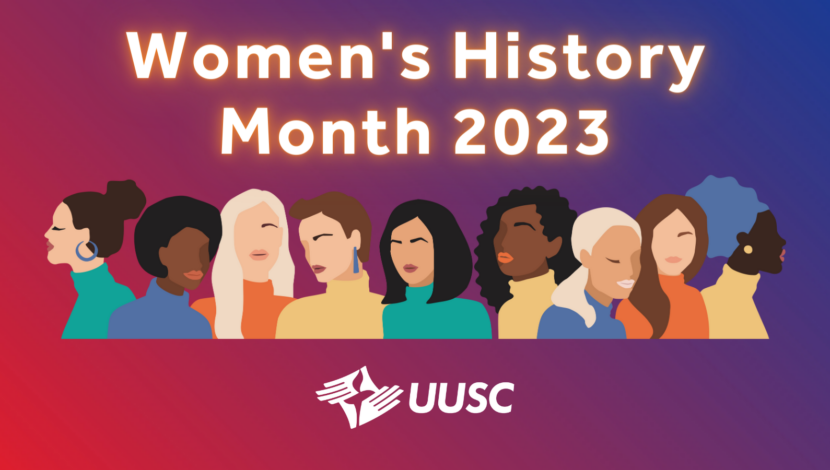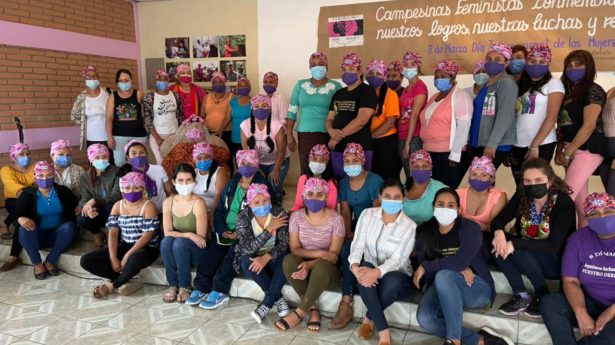The Unitarian Universalist Service Committee advances human rights through grassroots collaborations.
Women Making History…Today

By Suhra Nahib on March 8, 2023
March is Women’s History Month, a time to reflect on the many accomplishments women have made to our communities and culture. But there are women and girls across the world who are making history at this very moment.
In this video series, we will explore changemakers, from the United States to Haiti, who are making bold moves toward justice and equity.
Quo Vadis Gex Breaux
Quo Vadis Gex Breaux is the former executive director of the Center for Ethical Living and Social Justice Renewal (CELSJR). She worked there with volunteers dedicated to economic, social, and racial justice in New Orleans.
Breaux has also published poetry, essays, and creative non-fiction. She and her husband are from New Orleans, but due to the significant damage to their home during the hurricane, they had to make a hard choice and move out of hurricane zones. An active Unitarian Universalist, Breaux discusses her experiences with leadership and the campaign for economic, social, and racial justice.
Migrant Justice in Haiti
Groupe d’Appui aux Rapatriés et Réfugiés (the Support Group for Returnees and Refugees; GAAR) is an immigrant rights organization in Haiti focusing on protecting the rights of recent deportees from the Dominican Republic, the United States, and other nations. They have taken numerous actions on behalf of migrating people and also connect those victimized by law enforcement with competent resources and offer humanitarian assistance to those facing economic and social challenges.
Katia Bonté is the general coordinator of GARR. In an interview with UUSC, Bonte discusses the dangers women face in Haiti and the struggle for gender equality.
Women’s Rights in Afghanistan
Many Afghan women’s rights activists live outside of Afghanistan. They have asked for support from the international community to take action against the Taliban.
However, Mahbouba Seraj, a Nobel Peace Prize nominee, never left Afghanistan. She believes that the best way to fight against the Taliban is inside the country. She is also the founder of the Afghan Women’s Network, a group supporting women’s organizations in the country.
In an interview with UUSC, Seraj discusses human rights in Afghanistan.
Gender Justice in The Bahamas
Alicia Wallace is the director of UUSC partner Equality Bahamas. The organization supports vulnerable communities, women, and LBGTQ+ rights through advocacy and community engagement. Wallace’s community work has been recognized nationally as well as internationally.
Her advocacy journey started when she was young, tackling ubiquitous problems. Moreover, as a founder of Equality Bahamas, Wallace and her team are looking for solutions to gender-based violence through three lenses: institutional, structural, and interpersonal. At times, all of these lenses can be challenging
Wallace has worked with multiple nonprofit organizations in Canada, the United States, the United Kingdom, and the Caribbean. Below, Wallace shares her insights about female leadership.
Gender Equality in Haiti
AyiboPost is a UUSC partner in Haiti that does vital work at the intersection of the media and public interest. Their journalism provides a unique opportunity to call attention to injustice in the nation and re-frame the conversations being had around oppression.
Listen to Mike Hala Joy of Ayibo Post discuss the importance of gender equality in Haiti.
What is Feminism?
Mikki Kendall is a writer, diversity consultant, and “occasional feminist.” She often discusses intersectionality, policing, gender, sexual assault, and other issues of concern in modern America. In 2013, Kendall created a hashtag, #SolidarityIsForWhiteWomen, to vent her frustration about the lack of response toward the public breakdown of Hugo Schwyzer. Schwyzer, a blogger and a former gender studies professor, admitted that he slept with former students and used his position to silence women of color bloggers.
She had noticed that in this situation, White feminists were more concerned about his mental well-being than the fact that he had affairs with his former students and attacked women of color when they criticized his work.
Kendall’s influential New York Times bestselling book, “Hood Feminism,” draws attention to many problems within feminism. It talks about the problems of White feminism while introducing her thoughtful solutions. In an interview with UUSC, Kendall shares more insight into her views on feminism.

